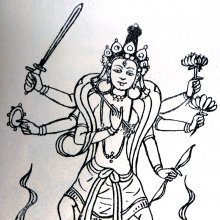Kankelli, Kaṅkelli, Kamkelli: 10 definitions
Introduction:
Kankelli means something in Buddhism, Pali, Jainism, Prakrit, Hinduism, Sanskrit, biology. If you want to know the exact meaning, history, etymology or English translation of this term then check out the descriptions on this page. Add your comment or reference to a book if you want to contribute to this summary article.
Images (photo gallery)
In Buddhism
Tibetan Buddhism (Vajrayana or tantric Buddhism)
Source: academia.edu: The Structure and Meanings of the Heruka MaṇḍalaKaṅkelli (कङ्केल्लि) refers to one of the eight trees (vṛkṣa) of the Guṇacakra, according to the 10th century Ḍākārṇava chapter 15. Accordingly, the guṇacakra refers to one of the four divisions of the sahaja-puṭa (‘innate layer’), situated within the padma (lotus) in the middle of the Herukamaṇḍala. Kaṅkelli is associated with the charnel grounds (śmaśāna) named Jvālākulakaraṅka; with the direction-guardian (dikpāla) named Varuṇa; with the serpent king (nāgendra) named Karkoṭa and with the cloud king (meghendra) named Ghora.

Tibetan Buddhism includes schools such as Nyingma, Kadampa, Kagyu and Gelug. Their primary canon of literature is divided in two broad categories: The Kangyur, which consists of Buddha’s words, and the Tengyur, which includes commentaries from various sources. Esotericism and tantra techniques (vajrayāna) are collected indepently.
In Jainism
Jain philosophy
Source: archive.org: Anekanta Jaya Pataka of Haribhadra SuriKankelli (कन्केल्लि) is another name for the Aśoka, as used in the Anekāntajayapatākā-prakaraṇa, a Śvetāmbara Jain philosophical work written by Haribhadra Sūri.—[Cf. Vol. I, P. 4, l. 3]—Aśoka, a homonym, here means a kind of tree. Its Pāiya (Prākṛta) equivalent ‘asoga’ occurs in Ovavāiya. The ‘Desi’ word for it is ‘kankilli’ or ‘kankelli’. The former occurs in Supāsanāhacariya (p 556) and Viyārasārapayaraṇa (v 461) and the latter m Rayaṇāvalī (II, 12, 404)
-
Biology (plants and animals)
Source: Google Books: CRC World Dictionary (Regional names)1) Kankelli in India is the name of a plant defined with Saraca asoca in various botanical sources. This page contains potential references in Ayurveda, modern medicine, and other folk traditions or local practices It has the synonym Jonesia pinnata Willd. (among others).
2) Kankelli is also identified with Saraca indica It has the synonym Jonesia asoca sensu auct. (etc.).
Example references for further research on medicinal uses or toxicity (see latin names for full list):
· Blumea (1968)
· Flora of Ceylon (1991)
· Species Plantarum.
· Retzia (1855)
· FBI (1878)
· Asiatic Researches (1795)
If you are looking for specific details regarding Kankelli, for example side effects, health benefits, extract dosage, chemical composition, pregnancy safety, diet and recipes, have a look at these references.

This sections includes definitions from the five kingdoms of living things: Animals, Plants, Fungi, Protists and Monera. It will include both the official binomial nomenclature (scientific names usually in Latin) as well as regional spellings and variants.
Languages of India and abroad
Sanskrit dictionary
Source: DDSA: The practical Sanskrit-English dictionaryKaṅkelli (कङ्केल्लि).—The Aśoka tree.
Derivable forms: kaṅkelliḥ (कङ्केल्लिः).
See also (synonyms): kaṅkella.
Source: Cologne Digital Sanskrit Dictionaries: Shabda-Sagara Sanskrit-English DictionaryKaṅkelli (कङ्केल्लि).—m.
(-lliḥ) A tree (Jonesia asoca, Rox.)
Source: Cologne Digital Sanskrit Dictionaries: Cappeller Sanskrit-English DictionaryKaṅkelli (कङ्केल्लि).—[masculine], llī [feminine] the Aśoka tree.
Source: Cologne Digital Sanskrit Dictionaries: Monier-Williams Sanskrit-English DictionaryKaṅkelli (कङ्केल्लि):—[from kaṅkeli] mf(ī). idem, [Vāmana’s Kāvyālaṃkāravṛtti]
Source: Cologne Digital Sanskrit Dictionaries: Yates Sanskrit-English DictionaryKaṅkelli (कङ्केल्लि):—(lliḥ) 2. m. Jonesia Asoka.
Sanskrit, also spelled संस्कृतम् (saṃskṛtam), is an ancient language of India commonly seen as the grandmother of the Indo-European language family (even English!). Closely allied with Prakrit and Pali, Sanskrit is more exhaustive in both grammar and terms and has the most extensive collection of literature in the world, greatly surpassing its sister-languages Greek and Latin.
Prakrit-English dictionary
Source: DDSA: Paia-sadda-mahannavo; a comprehensive Prakrit Hindi dictionaryKaṃkelli (कंकेल्लि) in the Prakrit language is related to the Sanskrit word: Kaṅkeli.
Prakrit is an ancient language closely associated with both Pali and Sanskrit. Jain literature is often composed in this language or sub-dialects, such as the Agamas and their commentaries which are written in Ardhamagadhi and Maharashtri Prakrit. The earliest extant texts can be dated to as early as the 4th century BCE although core portions might be older.
Kannada-English dictionary
Source: Alar: Kannada-English corpusKaṃkelli (ಕಂಕೆಲ್ಲಿ):—[noun] = ಕಂಕೆಲ್ಲ [kamkella].
--- OR ---
Kaṃkēlli (ಕಂಕೇಲ್ಲಿ):—[noun] = ಕಂಕೆಲ್ಲ [kamkella].
Kannada is a Dravidian language (as opposed to the Indo-European language family) mainly spoken in the southwestern region of India.
See also (Relevant definitions)
Full-text: Kankeli, Kankella, Ashoka, Kamkilli, Ghora, Jvalakulakaranka, Asoga, Varuna, Karkota.
Relevant text
Search found 2 books and stories containing Kankelli, Kamkelli, Kaṃkelli, Kaṃkēlli, Kaṅkelli, Kaṅkēlli; (plurals include: Kankellis, Kamkellis, Kaṃkellis, Kaṃkēllis, Kaṅkellis, Kaṅkēllis). You can also click to the full overview containing English textual excerpts. Below are direct links for the most relevant articles:
Bhakti-rasamrta-sindhu (by Śrīla Rūpa Gosvāmī)
Verse 3.5.20 < [Part 5 - Conjugal Love (mādhurya-rasa)]
The Indian Buddhist Iconography (by Benoytosh Bhattachacharyya)
